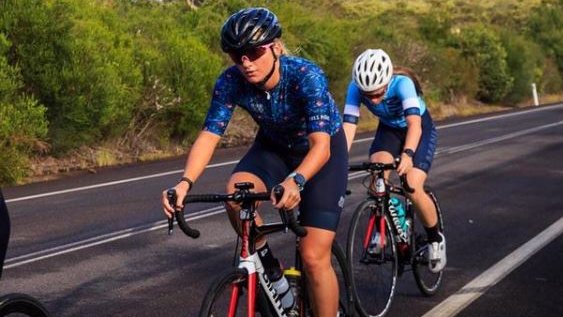When Alana Leabeater became the first woman to cross the line in a race at her local club this week, she was overjoyed.
Key points:
- Alana Leabeater identified several cycling events where women don’t get podiums or prize money
- She says it is discouraging and also creates an unwelcoming environment for women
- Stef Hanson says there’s a huge difference when it comes to equality for female triathletes compared to cyclists
But that joy quickly turned into frustration when her achievement went unrecognised — in direct contrast to the men competing in the same race, who were given prize money and presentations.
“No women’s podiums or prize money for any grade at Penrith CC Easter Creek crit (criterion), ” said Leabeater, who is an amateur cyclist and triathlete.
“Why do I have to beat both the men’s and the women’s fields to be recognised on the podium, but the men just had to beat the men?”
Being one of the few women to compete she was placed in a mixed gender race, with all racers paying a $15 entry fee which contributes to the prize pool.
When she crossed the finish line first ahead of five other women competing, she was ecstatic.
“I stayed around for the podium presentations to hear only the three first men’s positions announced and prize money was handed out,” she said.
“It didn’t even matter if we [women] were there at the end of the day … our entries are just to subsidise the men’s prize money, it’s unfair.”
Loading
She was surprised when another woman who finished second after her left straight after the race.
“She knew there was no recognition of the females,” Leabeater said.
The 24-year-old has been cycling for seven years and wants change.
“Unfortunately cycling still has a long way to go,” she said.
“I don’t care about prize money but I do care about equal recognition for equal effort.”
Loading
Clubs need to support women
She feels clubs need to be more supportive of women and acknowledge their efforts.
“Yes, the depth of the women’s field is smaller, but if you keep acting like we are not here, we will stop turning up because we don’t feel welcome and supported,” she said.
While different clubs have different rules, this is not a one-off experience.
“I raced two weeks ago with the Lidcombe Auburn Cycling Club (LACC) and on the starting line the women were told the [female] winner gets the equivalent prize money of the third place men’s,” she said.
“At the recreational and amateur level there’s strongly held beliefs that there’s no place for women, it makes you not want to come back.”
Other cyclists have reached out to her to share their experience.
“Agree completely, a few times I’ve placed and been 1st girl and not earned podium cash,” triathlete Ella Kate Hussein posted on Instagram.
“Our club has a lot of females racing which is great, we however don’t do podiums,” one male cyclist, Josh from Manning Valley Cycle club, said.
Leabeater has also been disappointed in how she’s been treated by fellow cyclists.
“The male cyclists can be very intimidating and belittling,” she said.
“Recently in a mixed gender race two of us [women] stayed with the pack until about half way then dropped off, when they came back around to pass me they were yelling at us not to take the inside corner — that would never happen if it was another man.
“There were also no women’s bathrooms, only men’s. How are we meant to feel welcome?”
Triathlete Stef Hanson founded an online women’s triathlon publication, WITSUP, in 2011 to boost the profile of female triathletes and get more women to compete.
She has been surprised by the disparity in prize money women face.
“Triathletes are very privileged when it comes to equality — women and men get the same prize money and it’s an equal sport,” Hanson said.
“From my experience that’s different to what is going on in cycling.
“There needs to be change because women are so far behind the eight-ball compared to men.
“I think it [cycling] is one of the least equal sports, even for the professionals. Women get paid less than the minimum wage, yet it’s one of the toughest sports to make it in.”
She believes increasing exposure of women’s sport will improve equality.
Leabeter has only recently returned to cycling after two serious accidents last year, but her recent experiences won’t deter her.
“I definitely could have been turned off, but I am determined to keep showing up and bring more girls with me so things get better,” she said.
“I hope in years to come no-one has to experience the smarmy behaviour and exclusion we have had to.”







